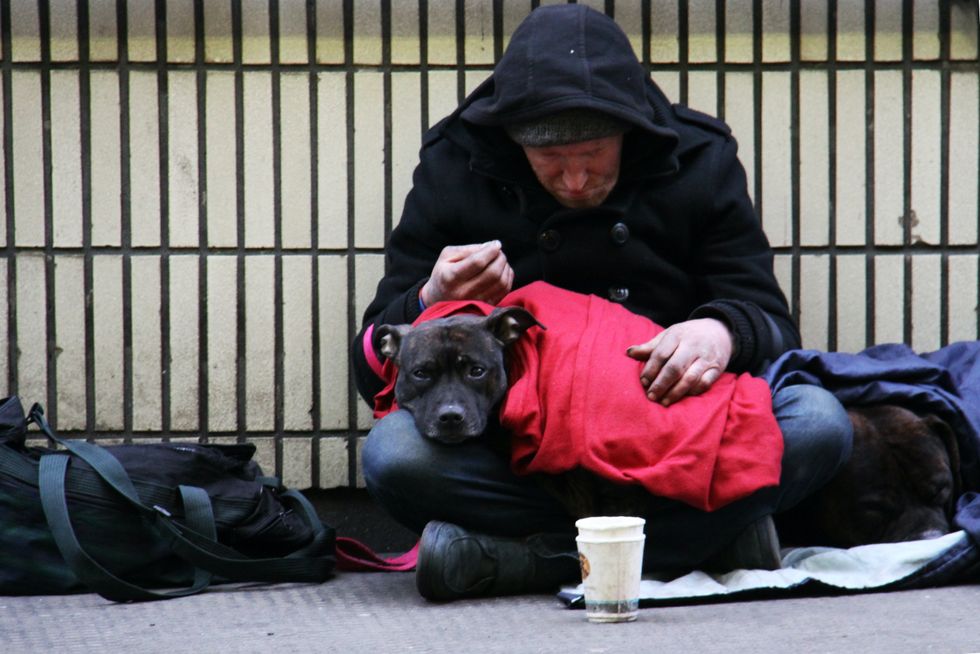Column: Investing in Technology and a Vision to Strengthen LA's Social Net
Dr. Tony Greco is CEO and Founder of Get Help, licensed clinical psychologist, and author, with over 20 years of experience working with addiction and severe mental illness.
He served on the Los Angeles County Psychological Association Board and Chaired the LACPA Early Career Psychologist Committee.
Dr. Greco earned his undergraduate degree in Business Management from Pepperdine University.
Prior to earning a doctorate in psychology Tony was Vice President of Business Development at a hospital detoxification and treatment program, expanding operations and programs. He worked as a business consultant in the treatment industry, writing program materials, and working with treatment executives to develop programs.
He was a manager of citywide conventions, conferences, meetings, and other events, in the non-profit and political sectors, including international twelve-step conferences, gubernatorial campaigns, and was liaison to His Holiness the 14th Dalai Lama during an official visit to California.
Tony is an advocate in the LGBT community, active member of a twelve-step community and church ministries that work with the homeless and addicted.

Before there were gas stations, roadways or traffic lights, people really couldn't drive their cars very much, or far. It took a while for momentum to build and create the pull for new services. During that time there were people who were just trying to get others to not use their horse.
Even with the technological advances we've seen in the last century, the pathway to recovery still involves jumping on your horse and going a quarter mile down the road.
I tell people all the time, as a psychologist and the founder of a tech company creating solutions to help people find treatment: There is a moment when someone decides they want help. When we come to it, we are filled with the simultaneous feeling of relief and dread. Relief that the person finally wants help, and dread about where to start and how to find them the right place in the brief window of time that desire to get help exists.
That is the window I've been dedicated to decreasing.

Mental Health Nonprofits and Their Struggles
When someone gets or makes that call for help in the mental health industry, there are countless directories, resource guides, websites and other attempts to capture both real-time information and basic essential information on resources.
The federal Substance Abuse and Mental Health Services Administration (SAMHSA), estimates that since COVID began, calls to their 800 number hotline have increased 1,000%. Yes, that's one thousand percent.
What do the people answering those calls depend on for their information? A postcard that is mailed out to facilities once a year and (hopefully) mailed back to SAMHSA. That's what they use to update their database. Many great organizations are often not listed or are out of date, duplicated or out of business when they are. Many of the providers I talk to don't remember ever getting that postcard.
They aren't the only government system that attempts to catalog this information. There are so many disparate, disjointed systems, it's impossible to properly inventory all of them. For example, the state of California has invested significantly in a system called the Service and Bed Availability Tool (SBAT). Any substance use disorder program receiving state or federal funding is required to update the system each day at a certain time of day. They need to do this manually, by either calling or by logging in to a portal and updating the information. Each SBAT system is managed separately by each county in the state. The data is not shared. Not with us, not with SAMHSA, and not with any other of the countless systems, databases or hotlines trying to get people help.
Meanwhile, Los Angeles County's homeless authority has their own "real-time bed availability system." The city of Los Angeles, too, dedicates some of their funding (both government and philanthropic) to creating a paper resource directory of available beds.
Non-government funded homeless shelters such as the Union Rescue Mission and recovery houses such as Awakening Recovery that also provide beds, can't be found in any of these systems because they do not receive government funding.
None of these systems are integrated with one another, all require a manual process of counting beds and updating a system, and none of it is anything a clinician in the public can easily or readily access.
How is a person making that midnight call to find someone help supposed to navigate all this? They can't.
It's not just a problem for those trying to solve homelessness. This happens amongst many programs and services across the county — and that same inefficiency, lack of coordination and miscommunication is replicated across the state and country.
Solving the Same Problem Again and Again
Even within this single space within a much larger industry there are nonprofit organizations competing with private enterprises for funding and resources, none of which are truly cooperating with one another. The for-profit, philanthropic and public businesses rarely cooperate. In fact, there are barriers to interact.
A hodgepodge of investors find themselves investing in an industry that desperately needs disruption. Alongside them are philanthropists who donate to nonprofits because they don't want to "make money" off helping the homeless or people with mental illness. Both end up investing deeply in disconnected or uncoordinated ideas.
Many, if not most, recovery residences are still operating using pen-and-paper methods to intake patients, track bed inventory and communicate with one another. At best, some programs use Excel or Google Sheets to communicate, or they pay for overly sophisticated electronic medical record (EMR) systems that are designed for clinical programs tailored for government or insurance billing practices.
Their marketing practices are often word-of-mouth, since programs such as these cannot advertise, even if they could afford to do so, on platforms such as Google, which requires facilities advertising any type of addiction treatment to be certified (which is often too lengthy and costly for non-clinical programs to undergo).
The industry must, by necessity, be more concerned with their daily operations and keeping their organization operating — making sure investors and donors are happy (i.e., beds are filled and patients moving through the program) than on attention to standards and outcomes. Even this is done in a vacuum, with each program focusing on their own goals and protocols, without effectively or efficiently communicating with one another.
What gets lost in all of this is the patient needing services.

The New Models
We see innovation happening on a small scale, at the individual program or regional association levels.
There are nonprofits creating positive cash flow with their donation monies, building a food kitchen, incentivizing and employing people who go through their programs who need employment, coming from vulnerable backgrounds.
Look at Homeboy Industries in Los Angeles, which calls itself "the largest gang rehabilitation and re-entry program in the world." Through their efforts they have created a bakery. Yes, rehabilitating gang members through bread making has turned into an industry of food chains, catering services and partnerships across the country. If you've been through LAX recently you've probably seen one of their restaurants.
These nonprofits are enterprising, opening and expanding business. They're organized as nonprofit hybrids that are breaking down the wall between nonprofit missions and private investment operations. They are partnering with other social enterprises and creating networks across the country and world.
The missing piece: connecting these organizations to one another, and giving professionals such as myself, and the public, access to find out more about them. We need these enterprises and programs connected in a platform that everyone can access.
A Post Pandemic World
What we are creating now is a new formula for success. In a post-pandemic era the need is greater than it's ever been.
The California Consortium of Addiction Programs and Professionals (CCAPP) refers to this phenomenon as the "parallel pandemic," where we will see an increase in addiction overdose deaths and homelessness. "Saving lives endangered by addiction in the era of COVID-19 will take concerted leadership and a cross-systems approach," the consortium wrote in a report to the governor and Legislature.
Prior to the pandemic, Feeding America estimated that 1 in 7 Americans depended on a food pantry for weekly food. That number is only going to rise following the joblessness and homelessness resulting from the pandemic, while the means to locate and provide such services is just as difficult and disconnected as ever from other services and providers. Various nonprofits — again, all functioning and operating independently — and organizations such as Foodpantries.org are providing those services but are disconnected technologically from other search tools and engines.
A social worker would need to know where and how to access these services and provide that information to the individuals receiving services.

Where Do We Go From Here?
We are seeing groups of people and organizations coming together now in new and unique ways. We are working with nonprofit organizations providing services, seeing those services get subsidized by philanthropic dollars, for technology that is backed by private investment dollars. All in the effort to get people off an oval track just going in circles, and onto a road, ultimately preparing them to drive down a superhighway that hasn't been built yet.
There is a nonprofit we are working with (can't mention the name yet), that received significant funding to create a digital resource directory. Rather than using that money to outsource technology developers to create a proprietary tool, we are partnering together, pooling our resources and sharing our technology to create something greater than the sum of our parts. Together, we are doing more than either of us could have done individually. This saves the nonprofit hundreds of thousands (if not millions) of dollars paying for the creation and maintenance of the tools we'll need to work together.
It also allows us to combine our collective intelligence and expertise, and create an even better tool, maintain that tool, and benefit from the collective wisdom of other partners across the country, in other segments, serving different communities.
To realize this vision, we'll need to build new onramps for public, private, and philanthropic partnerships. We need money to pave that way for the impact we want to see. That is exactly what we are working on at GET HELP, with our partners and affiliates.
What we're planning and creating together is a new infrastructure. One that is built by visionary customers, entrepreneurs and the next generation of social impact investors. Amongst these are the next Rockefellers and Carnagies. They didn't build or invent the automobile, but they supplied and fueled the infrastructure that surrounded, supported and sustained it.
We are creating partnerships and affiliate programs with national and statewide associations such as CCAPP and the National Alliance for Recovery Residences (NARR); with "feet on the street" organizations such as Hope through Soap in Atlanta, GA,; and with social-model recovery residence programs such as Awakening Recovery; and large homeless shelters and service providers such as House of Hope and the Weingart Center.
In addition, we are in collaborative conversations with seeming "competitors" in the private sector, where we are focused on the same vision: to raise the industry standards and improve the processes for collecting and sharing data.
It's better for everyone involved, including the ultimate beneficiary who may never know the work we are doing together to get help for them: The person suffering from mental health, addiction or homelessness.
What we — as the entrepreneurs and investors in the healthcare technology industry — are defining is a whole new infrastructure for a much longer journey to empowered recovery.
The question that we face on a daily basis is this: Who are the innovators both within the industry and without who are willing to invest time, effort and money into creating a new system?
Today, we see private automobiles driving on public roads --- those were built by public sector funds, and the public sector provides licensing and regulation. Using those models, we have to think broadly about sources of capital and how philanthropic, public and private companies can contribute to the journey.
Dr. Tony Greco is CEO and Founder of Get Help and a licensed clinical psychologist and author with over 20 years of experience working with addiction and severe mental illness.
- An App For California's Homeless and Those Who Help Them - dot.LA ›
- Pension Funds Could Be Key to Adding Diversity to VCs - dot.LA ›
- Samaritan App Builds a Support Network for LA's Homeless - dot.LA ›
Dr. Tony Greco is CEO and Founder of Get Help, licensed clinical psychologist, and author, with over 20 years of experience working with addiction and severe mental illness.
He served on the Los Angeles County Psychological Association Board and Chaired the LACPA Early Career Psychologist Committee.
Dr. Greco earned his undergraduate degree in Business Management from Pepperdine University.
Prior to earning a doctorate in psychology Tony was Vice President of Business Development at a hospital detoxification and treatment program, expanding operations and programs. He worked as a business consultant in the treatment industry, writing program materials, and working with treatment executives to develop programs.
He was a manager of citywide conventions, conferences, meetings, and other events, in the non-profit and political sectors, including international twelve-step conferences, gubernatorial campaigns, and was liaison to His Holiness the 14th Dalai Lama during an official visit to California.
Tony is an advocate in the LGBT community, active member of a twelve-step community and church ministries that work with the homeless and addicted.





 Image Source: Skyryse
Image Source: Skyryse